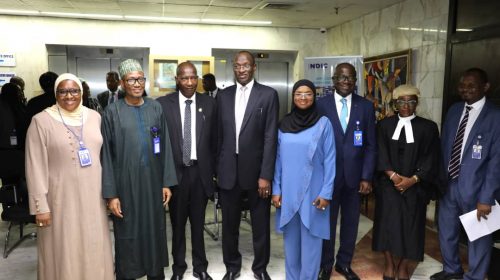NDIC Deploys Artificial Intelligence To Address Challenges
Born out of the desire to tackle daunting challenges facing the corporation, the Nigeria Deposit Insurance Corporation (NDIC) said it will deploy artificial intelligence unit within its system.
The Managing Director, NDIC, Alhaji Umaru Ibrahim who gave the assurance stated that NDIC has in the last 30 years of existence recorded numerous achievements, which he said came with its attendant challenges.
Speaking while delivering a welcome address at the NDIC 30th anniversary dinner in Lagos, Ibrahim noted that there was need to reposition the corporation ahead of the challenges.
He said: ‘In celebrating the 30 years, we reflects on what we have achieved and what we have overcome these years, we need to reposition the corporation ahead the challenges.
He highlighted the challenges to include growth of assets in the banking sector, growing population, changing customer preferences, poverty, unemployment among others.
Ibrahim assured that NDIC was aware of the emerging roles of FinTech in the fast developing digital currencies adding that in appreciation to that, arrangement was underway to establish digital financial technologies in NDIC.
He pointed out that NDIC recently signed a Memorandum of Understanding (MOU) with the Korea Deposit Insurance Corporation (KDIC) on a wide range of issues intended to facilitate the robust implementation of the Deposit Insurance System in the country.
Speaking on the Corporation’s achievements, he stated that NDIC was in the last 10 years focused on training and retraining of its staff on emerging issues such as Financial Technology (FinTech), Virtual Currencies, Digital Finance, Cyber-crimes, among others.
He said within the period, over 75 per cent of the corporation’s staff were upgraded.
Ibrahim further stated that the first decade of the corporation was saddled with the responsibility of managing distress in the banking system adding that the It has adopted multiple distress resolution options which included provision of financial assistance to deserving institutions, imposition of holding actions, change of management of affected banks, and assisted mergers.
He said “The Corporation also implemented the Failed Banks (Recovery of Debts) and Financial Malpractices in the Banks Act 1994, which established Failed Banks Tribunals to prosecute those who were responsible for the failure of the banks”.
He further explained that the second decade in the corporation’s evolution has been defined by its responses to the regulatory challenges of bank consolidation policy of 2005 as the corporation adopted the purchase and assumption (P&A) system to resolve the problems of 13 banks whose licenses were revoked for failing to meet the N25 billion capital requirement.
Peoplesdaily






Leave a Reply